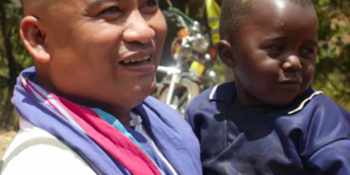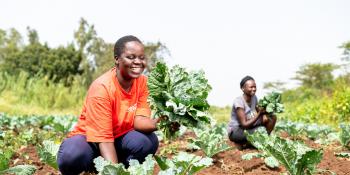Volunteer filmmaker Sue Turbett has just returned from Bangladesh, capturing first-hand projects that are investing in the livelihoods of women such as Sathi and Laxmi. From improving farming practices to training in crab fishing, see how VSO is transforming the lives of women in rural Bangladesh.
From child marriage to prosperous farmer – Laxmi's story
Laxmi was forced to drop out school and get married at just 13. Dependent on her husband to support their family, she struggled to make ends meet at their small home in Shyamnagar, West Bangladesh.
VSO came forward with an offer to train Laxmi in organic farming and that has transformed her life.
Now she and her husband have more than enough to eat, providing food not just for the family but also selling their surplus crop at the local market. That in turn, has enabled Laxmi to invest in her future, with her profits spent on buying a cow and two goats.
“The cow gives us milk and I use cow dung as fertiliser on the land. I sell the milk, as well as give it to my children. Every year the cow delivers a calf, which I sell when it’s grown up and make more profit,” said Laxmi.
“Every three months the goat delivers a kid. I sell four goats per year,” Laxmi added.
Not only can Laxmi afford to keep her daughter in school and keep her from a child marriage – but she can afford to treat her to small gifts.
Sue Turbett, who spent time with Laxmi’s family, explains the importance of having the extra money beyond necessities.
“Laxmi was able to buy her daughter earrings, which spoke volumes because it showed they had the extra money, which is such a luxury. You don't buy earrings if you can't afford three meals a day. This not only says that things are now okay, but it shows the rest of the community that they are doing well.”
Crab fishing for a sustainable future – Sathi shares her story
Sathi Das used to be reliant on her husband for money to feed, clothe and educate her two sons. With her gender barring her from most work in Mongla, southern Bangladesh, life was often a struggle.
Then she heard about VSO’s women-only training in crab fishing. Her involvement has become a significant part of her life, with Sathi becoming President of the Crab Farmers Group. She’s now able to earn a living herself and contribute to the household; a far cry from her life before.
“I used to feel sad and hopeless because I couldn’t earn anything and had to depend on my husband. After I finished my training, I started crab farming and told my husband how we could become profitable,” she says.
With her income, Sathi can provide for her children’s education but she also stresses how the project has benefitted her in other ways , including gaining the respect of her husband and the wider community.
It’s a point confirmed by Sue: “I spoke to Sathi's husband. He was so proud of what she had done and that she was contributing to their future, prosperity and resilience,” she says. “Sathi’s husband was very much in support of her employment as it raised their standing in the community as she was now an important person.”
VSO’s focus on gender in farming projects means that more women can earn money for their families, with them gaining confidence and participating more in decision making within households. For Sue, it’s amazing how far even small investments could go.
“The most interesting aspect is how little money it takes to change a life. Something as small as an £100 loan, will turn a family around. You're not talking big bucks, you're not talking about just doing it short term, this is a small investment for a life changed forever," said Sue.
“Sathi and Laxmi perfectly illustrate how you can put a very tiny amount of money into the hands of a single woman and she will do amazing, lasting things with it.”
Read more

Lessons from a VSO education volunteer
Juanito Estrada shares what he has learned from his 10 years volunteering with VSO, including tips on how to make an impact on placement.

Resilient livelihoods
Ensuring people have the skills needed to support themselves and their families.
Over 400,000 people benefited from our work supporting livelihoods using our current strategy.
